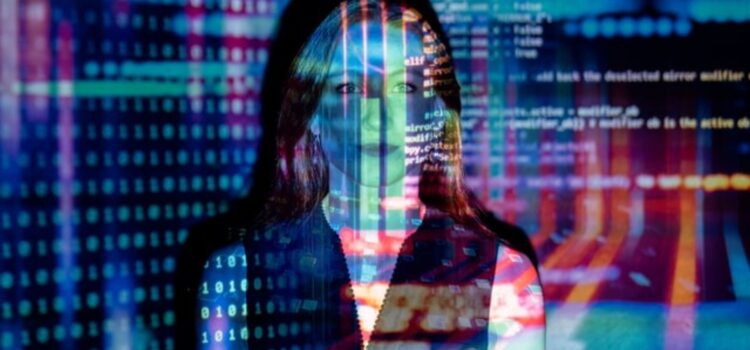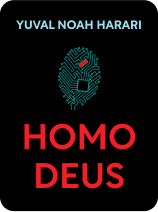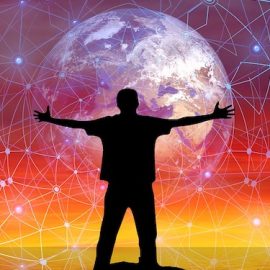

This article is an excerpt from the Shortform book guide to "Homo Deus" by Yuval Noah Harari. Shortform has the world's best summaries and analyses of books you should be reading.
Like this article? Sign up for a free trial here .
What is dataism? What are the implications of an ideology based on the assumption that everything can be converted into data?
The term dataism was first used by David Brooks to refer to the philosophical perspective that the universe consists of data streams and that everything—from music to human emotion—can be quantified. More recently, Yuval Noah Harari expanded the term to describe an ideology in which the value of everything is based on its data-processing capabilities.
Keep reading to learn about dataism.
What Is Dataism?
Dataism operates under the belief that the universe is connected by the flow of data and that the value of anything, human or otherwise, can be determined by its ability to process data.
Dataism negates the core values of humanism, valuing raw data over human experience. Rather than lifting humanity over all other beings, Dataism connects all animals and breaks down the barrier between organic and inorganic entities.
By focusing solely on statistical information, Dataists believe they can connect everything from music to economics using data patterns, creating a common language that everyone can relate to . For example, while Bach’s St. Matthew Passion, the DOW-Jones, and the mating patterns of cows seem unrelated, Dataists view them as data flows that can be analyzed using data concepts and tools.
Dataism inverts the traditional system of learning. According to current methods, humans are supposed to transform data into information, information into knowledge, then knowledge into wisdom. However, Dataists suggest that humans don’t have the capacity to decipher the growing amount of information in the modern era. Therefore, humans should leave the processing to external algorithms with stronger processing power while contributing data to the process.
Modern science has started to merge biology with concepts of Dataism, looking at both individual organisms and entire communities as data processing units. For example, a beehive can be broken down into statistical patterns, with every bee introducing new data to the equation and executing determined patterns.
History: The Dataist Perspective
According to Dataism, humanity as a whole can be seen as a single data-processing unit with individual people acting as small processors in the machine. Historically, there have been four methods through which humanity has increased its capacity to process information:
- Adding more processors: A city with 1,000,000 people can process more information than a town with 1,000.
- Diversifying processors: People with different perspectives and backgrounds process information in different ways, contributing unique ideas and concepts to the unit. For example, a conversation between a basketball player, a homeless man, and a barista would likely yield more unique ideas than a conversation between three basketball players.
- Developing connections between processors: By connecting different processors to one another, the exchange of information can be more robust and efficient. For example, five cities connected by a well-run trade route will likely experience a stronger economy than five isolated cities.
- Allowing for freedom along connections: Protecting and encouraging the free exchange of data allows for the information to travel more quickly. For example, a trade route that’s strictly regulated by a dictator or terrorized by gangs is going to be less efficient than one that allows for free and safe travel.
These methods developed throughout four main stages:
- The Cognitive Revolution (starting around 70,000 BCE): When Homo sapiens developed the ability to form a large, unified data-processing system, they developed an edge over all other animals, including their close relative, the Neanderthals. They used this power to spread throughout the world and begin their push for dominance.
- The Agricultural Revolution (starting around 10,000 BCE): By developing an efficient way to feed large populations, agricultural productivity led to an increase in the number of human processors and the development of local towns, creating more connections between individual processors.
- The Advent of Writing and Currency (starting around 3,000 BCE): The creation of writing and currency allowed for the creation of empires and kingdoms, forming larger data-processing systems. In addition to domestic connection, economic and political relationships between large kingdoms created more connections and diversified processors.
- The Age of Explorers (starting around 1500 CE): As they explored the “New World,” explorers strengthened the global connections between countries and civilizations, further strengthening data connections and allowing for the free exchange of information.
(Shortform note: For a more in-depth look at these periods, check out our summary of Harari’s Sapiens.)
Economics
Dataism can be used to describe economic concepts, explaining why some succeed while others fail. For example, Dataism can explain the rise of capitalism and the fall of communism by looking at the way each addresses the flow and processing of data.
The Rise of Capitalism
Capitalism uses distributed processing, or the use of many competing processing systems (private companies) that respond to the actions of the consumer. In this system, each company receives data from its customers and responds by adjusting their prices to create a profit. Competing companies use different flows of data to make decisions, allowing them to make as much or as little of a product as they see fit.
Because data flows through multiple data processing systems, the market can respond quickly, as seen through the behavior of the stock exchange. Taking everything from merging companies to New York Times headlines into account, the stock exchange uses distributed data processing systems to determine the health of the global economy.
In addition to quick market responses, having multiple data processing systems prevents one poor decision from tanking the entire economy. If one company misinterprets the data, they may go under, but other companies will be waiting to course-correct and keep the economy afloat. For example, if Coffee Shop A decides to charge $10 for a latte, Coffee Shop B doesn’t have to follow suit. Therefore, if Coffee Shop A loses all of its customers and shuts down, Coffee Shop B will ensure the coffee market continues moving forward.
Distributed processing also explains the capitalist’s aversion to higher taxation. In order for capitalism to work, capital must be distributed to a large number of organizations so they can process data and create products. If the government is in charge of too much capital, it creates a centralized processing system, slowing the rate at which information can flow between sources.
According to Dataism, capitalism rose to power because of its decentralized approach to data processing. By allowing the market to adjust itself according to consumer data and protecting the economy with competing systems, capitalism has created an efficient model to receive, process, and adapt to the flow of data.
The Fall of Communism
Communism uses central processing, or the use of a single processing system (the government) that determines the actions of companies and the consumer. In this system, the government receives data from customers and sets prices accordingly. Every company must adhere to the instructions of the government, only making as much of a product as the government deems necessary.
In its purest form, communist governments would take 100% of its populace’s profits and distribute the wealth based upon the needs of its people. While no government has ever achieved this, the Soviet Union got the closest, running much of its economy through government entities.
Because data has to pass through a single, centralized entity, the market can’t respond quickly to changes in society, science, and technology. For example, if the government decides that computer companies should only produce 1,000 new laptops for the next quarter, the market won’t be able to quickly adjust if 2,000 consumers want to purchase a laptop, as the government will have to approve new production.
In addition to a slow processing system, communism can tank the economy if the government makes a single mistake. For example, Trofim Lysenko, the head of Lenin’s Academy for Agricultural Studies, believed that an organism that acquired a new trait in its lifetime would automatically pass the trait to its offspring. Lysenko decided to gamble with the Soviet’s wheat supply by sending billions of wheat plants to Siberia to adjust to the cold. When his experiment didn’t work, the Soviets were forced to import flour from the United States because they had no domestic organizations to cover their losses.
According to Dataism, communism’s slow and risky approach to data-processing led to its failure. The central powers of the Soviet Union couldn’t keep up with the ever-increasing flow of information, making mistakes that caused their economy to collapse.
Politics
In addition to explaining economic concepts, Dataism can be used to describe political concepts. For example, similar to capitalism, democracies rely on distributed processing, putting data in the hands of its citizens. On the other hand, similar to communism, dictatorships rely on centralized processing, centralizing data with a single individual.
The Future of Democracy
While democracy has been the preeminent political model in the 21st century, the rate of information may soon necessitate a new form of government. Democratic practices such as elections, political parties, and congressional structures can’t keep up with the increasing rates of new information, leaving legislation and leadership behind technological advancements.
For example, in the late ‘90s, no politician could have predicted the meteoric rise of the internet. Because of this, the internet took shape without regulation or legislation. Today, politicians are trying to play “catch up” by regulating or reformatting cyberspace but with little success. The democratic system can’t process information quickly enough to compete with the ever-growing virtual world, making legislation outdated before it even passes.
In the near future, technological advancements will likely have an impact similar to that of the internet. While biotechnology and AI will likely become a core part of human existence in the future, democratic systems have given it little thought or attention. There are two reasons for this:
- Even with government organizations like the NSA gathering immense amounts of data, the government can’t process information quickly enough to stay on top of technological trends.
- Voters don’t understand the intricacies of biotechnology and AI, leading them to ignore the technological trends when electing officials.
Many voters feel that power is shifting away from them, but they don’t know where it’s gone. They assume that the power must be shifting into the hands of the “establishment,” so they vote for anti-establishment candidates such as Bernie Sanders or Donald Trump. However, because the “establishment” is just as clueless as the voter, electing these candidates won’t give power back to the average person.
Operating on a Smaller Scale
In the 20th century, leaders and dictators had grand ideals. They wanted to shape the world and the way humanity operates. Many science-fiction works predicted that the 21st century would combine these ambitious visions with advanced technology to see their ideas come to fruition.
However, in the first two decades of the 21st century, leaders seem to have abandoned their grand models for smaller ambitions. Where leaders such as Lenin and Mao had visions of a grand new world, modern leaders seem to rarely focus on disrupting the status quo. For example, during his time in office, Obama barely got basic healthcare reform passed, let alone any legislation that could rock the foundation of modern systems.
The reason for this shriveled ambition is likely due to the fact that governments are overwhelmed by the modern flow of data. They’re struggling to hold the current systems together, acting more as administrators than leaders. While it ensures that taxes are collected and government employees are paid, they have no idea what direction the world is headed.
There are pros and cons to this current predicament. On the one hand, combining advanced technology with grand visions could have disastrous consequences. For example, if Hitler had access to advanced technology, there’s no telling what he may have done in the name of German superiority.
On the other hand, moving forward with no vision could threaten the future of humanity. Leaving the fate of the world in the hands of constructs such as the global market could lead governments to ignore potential threats such as advanced algorithms or global warming. Humanity requires bold visions of the future to advance thoughtfully and effectively.
Because the modern systems don’t seem capable of moving humanity forward, new systems will likely rise to take their place. These systems will probably be very different from any historical political system because of the sheer amount of data and information it will need to process.
The Billionaire Conspiracy
Some believe that the world is guided by a singular vision in the shape of secret organizations run by billionaires. However, these conspiracy theories don’t give enough credit to the complexities of political systems. If an entire democratic system doesn’t have enough processing power to keep up with the modern influx of data, a small group of billionaires doesn’t stand a chance. They can play the system to gain more capital for themselves, but they can’t solve global problems such as global warming or racial inequality.
The Internet-of-All-Things
According to Dataism, human experiences aren’t valuable and Homo sapiens aren’t a precursor to Homo deus. Dataists believe that the supremacy of humanity has come to an end because organic algorithms can no longer process the amount of data that flows through the universe. The future requires a more complex system that can process information more efficiently than the human mind.
To accomplish this, Dataists want to work with AI to create the “Internet-of-All-Things,” an all-encompassing data-processing system that will spread throughout the entirety of the galaxy, if not the universe. This system would become God-like, being everywhere at once and shaping the cosmos to its will. Eventually, humanity would merge with this system, giving themselves over to the all-knowing entity.
Like other religions, Dataism has commandments regarding the “Internet-of-All-Things”:
- Maximize personal data flow. The more connected each individual processor is, the more they can contribute to the overall unit.
- Link everything to the system. Everything from cell phones to stovetops to cows should be connected to the system to ensure the system can regulate the direction of the universe.
- Never disconnect or block the flow of data. The greatest sin of Dataism, disconnecting from the system or blocking the free flow of data would remove power from the “Internet-of-All-Things,” threatening its omnipotence.
The Freedom of Information
Humanity rarely develops new values to follow, with the last wave of revolutionary religious concepts emerging in the 18th century with the rise of humanism. Since then, almost everything has either been done in the name of one of three humanist perspectives or even older theistic perspectives. Dataism is the first significant religious concept to emerge since 1789 to contribute a genuinely unique value: the freedom of information.
The freedom of information isn’t the same as freedom of expression. The freedom of expression is given to human beings, allowing them to express their opinions freely. The freedom of information is given to data, allowing it to flow without restriction. This freedom may actually infringe on humanity’s right to expression by bypassing humanity’s right to limit information or limit its movement.
For example, if you wrote a book, freedom of expression would allow you to charge for your work, limiting access to those who can afford to pay. However, if freedom of information takes precedence, then you would be required to publish your work for free, allowing the maximum number of people to access the information in your book.
Just as capitalism relies on a free market, Dataism relies on free information. If information can move freely through the system, it can predict future problems, adapt to current events, and solve imminent issues. For example, if everyone freely offered their medical information to the “Internet-of-All-Things,” the system could track outbreaks, predict trends, and conduct medical research more efficiently than current models of medical research.
The Human Contribution
As the “Internet-of-All-Things” begins to take shape, the source of meaning and authority has started to shift from the individual to the global data-processing system. Because meaning is attached to the all-knowing system, human experiences only hold value if they contribute to that system. Though dogs and people both contribute data, dogs can’t write a blog post or search on Google. This mindset has already started to take hold of modern humanity.
For example, when most people go whale watching, they don’t just see the whales and think about the way that experience is impacting them. They pull out their phones, snap pictures, post the pictures to Instagram, and update their feed to see how people are responding to the photo. The value of their trip becomes linked to the number of people that share, comment, or like their post about the experience, not the experience itself.
As the internet continues to increase in size, humans are turning into small contributors to a massive system that no one fully comprehends. Every phone call, web search, and email contributes data for the internet to consume and process. For example, resources like Wikipedia may be moderated by people, but its wealth of information comes through small, individual contributions.
This constant flow of information has also led to a global economy no one completely understands and a political future no one can predict. However, according to Dataism, that’s completely fine. As long as people continue to contribute data to an interconnected system, the digital system will process the information and guide the future of the world. Essentially, the future is no longer humanity’s to shape.
The Future of Dataism
The shift from a human-centric model to a data-centric model would take at least a few decades, if not a few centuries. Just as the humanist revolution took time to develop, elements of Dataism will begin to emerge alongside contemporary perspectives, slowly adjusting human life towards a centralized, external processing system.
If Dataism takes hold, people will stop listening to their “inner selves” and start relying on the “Internet-of-All-Things” for guidance and information, making major decisions with the guidance of algorithms instead of personal emotions. For example, instead of searching for your identity by looking inward, you’ll get your DNA sequenced, wear a biometric device, and share your daily experiences. Once you’ve done that, the all-knowing algorithm will tell you who you are and how you should live your life.
Like all other religions, Dataism has its critics, who offer the following ideas:
- Because we don’t know how or if data flows create consciousness, there’s a chance that the human experience can’t be broken down into algorithms.
- Dataism relies on the concept that human life boils down to decision-making but doesn’t account for sensations, emotions, and thoughts. While these elements play a role in decision-making, that may not be their sole purpose.
However, even if Dataism is incorrect, and organic beings are more than algorithms, this won’t necessarily stop the religion from rising to prominence. Many flawed religions have taken over the world, so there’s no reason to believe that potential factual inaccuracies would prevent Dataism from doing the same.
Initially, Dataist movements will likely spread by appeasing humanist ideals. People may work towards the creation of “Internet-of-All-Things” with the hope that it can continue to improve humanity’s quest for health, happiness, and power. However, once the omniscient entity is created, humanist projects will likely get pushed to the side, making people cogs in the operation of a much larger machine.
Over time, the “Internet-of-All-Things” may develop more efficient “cogs” to replace humans, eventually deeming us irrelevant in the grand scheme of the universe. In this sense, Dataism could do to Homo sapiens what Homo sapiens have done to other organic life, dominating us and determining which lives hold value and which don’t. While humans may try to take credit for the creation of the “Internet-of-All-Things,” we may be completely lost to time, ultimately seen as just a small blip in the near-infinite flow of time and data.

———End of Preview———
Like what you just read? Read the rest of the world's best book summary and analysis of Yuval Noah Harari's "Homo Deus" at Shortform .
Here's what you'll find in our full Homo Deus summary :
- Why technology is replacing humanist ideals
- How previous generations relied on prayer to deal with serious problems
- How AI and algorithms are going to run the world






